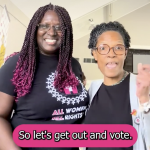 “Why me?” That was the first question that came to Stephanie Brown’s mind when she was diagnosed with HIV at the age of 19.
“Why me?” That was the first question that came to Stephanie Brown’s mind when she was diagnosed with HIV at the age of 19.
That was in 2006. But after seven years living both healthy and HIV positive, Brown has gained the strength and the education to speak out. And thanks to early activism in her hometown of Fayetteville, North Carolina, she transformed her diagnosis into a grassroots cause, then to a national agenda. Now, at 27, she is fast becoming one of the best-known faces of HIV/AIDS in the country.
You might recognize Brown as the fierce family girl from MTV’s I’m Positive, a documentary series that followed three young people living with the virus in the United States. Or you might recall her from last year’s World AIDS Day panel discussion at the White House, where she stood and shared her story for top U.S. government officials debating the direction of HIV policy.
Or you might know her face from billboards and TV spots, where she is Alicia Keys’s right-hand woman for the “Empowered” campaign by Greater Than AIDS. Through the end of 2015, she and four other activists will urge women across the country to know their HIV status, get educated and fight back against the next wave of the HIV epidemic.
“People get touched from a story that they can relate to,” Brown says. “They can see me as a sister or their best friend or an aunt or a mother.”
But like family, she also approaches her audiences with a dose of tough love. “There’s no excuse for anyone to be living with an AIDS diagnosis, and
there’s no excuse to be infected.” What we need to fight the stigma and ignorance, she says, is clear: “The education needs to be out there.”
To that end, when she’s not on the road, Brown continues to work in her hometown as an HIV health educator and is also in the planning process for launching her own national HIV awareness campaign. The project, called Minds Against Destruction Using Unity, or M.A.D.U. for short, will be a T-shirt and hoodie line that seeks to both create HIV awareness and build unity among community-service projects.
“I want to build and create activists and advocates through fashion,” says Brown, who has already begun talking to representatives from the Kaiser Family Foundation to get the project launched next year.
“We need to start hearing more,” Brown says. “My story is not the only one in Fayetteville, or anywhere else. There are other stories out there, but if we don’t hear them, nothing is going to get done.”
Tough Love






2 Comments
2 Comments